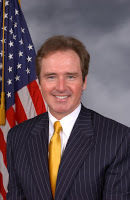
WASHINGTON, D.C. — The co-chairs of the House of Representatives Cancer Caucus, Congressmembers Brian Higgins, D-Buffalo; Charlie Dent R-Pa.; Derek Kilmer, D-Wash.; and Kevin Yoder, R-Kan., are teaming up for a bipartisan push to make the fight against cancer a national priority.
Congressman Brian Higgins is a member of the House Budget Committee and the Committee on Ways and Means. His district includes Roswell Park Cancer Institute, one of just 45 National Cancer Institute (NCI) designated comprehensive cancer centers in the country. Higgins is a champion for a substantial increase in the nation’s commitment to biomedical research and founded the National Institutes of Health Caucus.
“The only failure in cancer research is when you quit or are forced to quit due to lack of funding,” said Rep. Higgins. “By working together, Congress can help give researchers the tools to reach breakthrough treatments that lead to better outcomes for those touched by cancer.”
Congressman Charlie Dent serves on the House Committee on Appropriations. He is a staunch advocate of medical research through the National Institutes of Health (NIH), and has dedicated his efforts to the prevention of melanoma and colorectal cancer. Rep. Dent led a resolution encouraging efforts to promote childhood skin protection toward the goal of reducing skin cancer and recently introduced the Removing Barriers to Colorectal Cancer Screening Act.
Rep. Dent said, “Like many people, I have friends and loved ones who have been diagnosed with cancer. I’ve seen the toll cancer takes on both those who have been diagnosed and their caregivers. As co-chair of the House Cancer Caucus, I am committed to using my platform to encourage early detection and preventative measures, as well as funding for research that could lead to new, more effective treatments.”
Congressman Derek Kilmer is a member of the House Appropriations Committee and a strong advocate for the inclusion of cancer prevention measures as a component of healthcare delivery. Rep. Kilmer’s district includes Peninsula Cancer Center.
“Each year millions of Americans are confronted with a cancer diagnosis,” said Kilmer. “These struggles impact the lives of their family, friends, and communities. This Congress needs to step up and help folks grappling with this illness. That’s why I’ve joined the push to ensure that we double down on cutting-edge research investments that can help America’s top scientists figure out how to better stop the spread of cancer.”
Congressman Kevin Yoder, also a member of the House Appropriations Committee, is a leading voice in support of increased federal investment in biomedical research through the National Institutes of Health and in 2015 led a successful effort to convince more than 100 of his fiscally conservative colleagues to support the largest NIH funding increase in more than a decade. He’s also authored a resolution recognizing the critical role of researchers, and has been a long-time supporter of the University of Kansas Cancer Center receiving its National Cancer Institute designation in 2012 and applying for its comprehensive designation this year.
“Providing the necessary resources to help researchers around the country find cures for diseases like cancer has been a top priority of mine in Congress,” said Rep. Yoder. “As co-chair of the Cancer Caucus, I will do my part to eradicate this terrible disease by working toward my goal of doubling the National Institutes of Health (NIH)’s budget within the next ten years. I call upon my colleagues to share in that goal. It is a moral, fiscal, and national security imperative.”
The World Health Organization reports 1 in 6 deaths worldwide are due to cancer, with 14 million new cancer cases reported in 2012 and that number expected to increase by 70% over the next two decades. In the U.S. the National Cancer Institute estimates there were more than 1.685 million new cancer cases and over 595,000 deaths due to cancer last year alone. The cost of cancer care in the United States totaled nearly $125 billion in 2010 and could reach $156 billion by 2020.
from Congressman Brian Higgins via IFTTT

